Матеріали до уроку "The Most Famous People in Britain’s History".
The Most Famous People in Britain’s History.
Text 1.
Read and translate the text about Margaret Thatcher.
Vocabulary:
- descend [dɪˈsend] - знижуватися, низійти, опускатися;
- inexperience [ˌɪn.ɪkˈspɪə.ri.əns] - недосвід, недосвідченість;
- nonetheless [ˌnʌn.ðəˈles] - все-таки, однак, проте;
- indomitable [ɪnˈdɒm.ɪ.tə.bl̩] – невгамовний;
- brook [brʊk] - терпіти;
- dub [dʌb] - обрубувати, обтісувати, припасовувати;
- moniker [ˈmɒn.ɪ.kə] – кличка;
- deregulation [ˌdiːˈreɡ.jʊ.leɪt] – дерегулювання;
- impact [ˈɪmpækt] - вплив, імпульс;
- consecutive [kənˈsek.jʊ.tɪv] - наступний, послідовний;
- topple [ˈtɒp.l̩] - валити, загрозливо нависати;
- disastrous [dɪˈzɑː.strəs] - згубний, злигодній, зловісний;
- imposition [ˌɪm.pəˈzɪʃ.ən] - нав'язування, накладання, накладення.
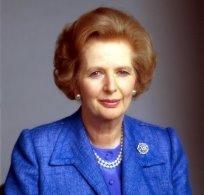 Britain's first female prime minister came to power with the country descending into industrial and economic chaos. A relatively inexperienced politician, she nonetheless adopted a personal style of indomitable self-confidence and brooked no weakness in herself or her colleagues. Derisively dubbed the 'Iron Lady' by the Soviet press, she wore the moniker with pride.
Britain's first female prime minister came to power with the country descending into industrial and economic chaos. A relatively inexperienced politician, she nonetheless adopted a personal style of indomitable self-confidence and brooked no weakness in herself or her colleagues. Derisively dubbed the 'Iron Lady' by the Soviet press, she wore the moniker with pride.
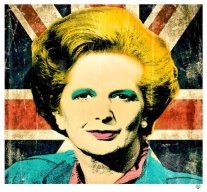 Her government's free-market policies included trade liberalization, deregulation, sweeping privatization, breaking the power of the unions, focus on the individual and the creation of an 'enterprise culture'. 'Thatcherism' has had a profound and lasting economic and social impact on Britain, and still sharply divides opinion to this day. The first PM to serve three consecutive terms, she was eventually toppled by her own party following the disastrous imposition of a 'poll tax'. Nonetheless, she is generally considered one of the best peace time prime ministers of the 20th century.
Her government's free-market policies included trade liberalization, deregulation, sweeping privatization, breaking the power of the unions, focus on the individual and the creation of an 'enterprise culture'. 'Thatcherism' has had a profound and lasting economic and social impact on Britain, and still sharply divides opinion to this day. The first PM to serve three consecutive terms, she was eventually toppled by her own party following the disastrous imposition of a 'poll tax'. Nonetheless, she is generally considered one of the best peace time prime ministers of the 20th century.
Tasks
Рівень 1
1. Write “true”, “false”.
- Margaret Thatcher is Britain's second female prime minister.
- She was a very experienced politician.
- She was derisively dubbed the 'Iron Lady' by the Soviet press.
- Margaret Thatcher wore the moniker 'Iron Lady' with pride.
- She is generally considered to be one of the best peace time prime ministers of the 20th century
2. Find the text the Ukrainian equivalents for:
Relatively, inexperienced, self-confidence , weakness, colleague, free-market,
the best peace time, a 'poll tax'.
Рівень 2
1. Match the words with the opposite meaning.
- Weakness a) surface
- Profound b) failing
- Peace c) the worst
- the best d) war
- self-confidence e) humbleness
- pride f) self-doubt
2. Write a composition about Margaret Thatcher.
Рівень 3
1. Unscramble the words.
lfamee, cemonioc, presanol, kewasnes, grnvenomte, udinivlida, acentrio, cenoscvutie.
2. Answer the questions.
- Who was Britain's first female prime minister?
- Did she have the moniker in the Soviet press?
- Did she wear the moniker 'Iron Lady' with pride?
- Has 'Thatcherism' had a profound and lasting economic and social impact on Britain?
- She is generally considered one of the best peace time prime ministers of the 20th century, isn’t she?
Text 2.
Read and translate the text about Sir Winston Churchill.
Vocabulary:
- controversial [ˌkɒn.trəˈvɜː.ʃəl] - дискусійний, полемічний, спірний;
- 'crossed the floor' [krɒs ðə flɔː] - переступати поріг;
- defect [ˈdiː.fekt] [- брак, вада, дефект;
- resignation [ˌrez.ɪɡˈneɪ.ʃən] - відставка;
- single-handedly [ˌsɪŋ.ɡl̩ˈhæn.dɪd] – одноосібно;
- restore [rɪˈstɔː(r)] - віддати, відновити, відновлювати;
- refusal [rɪˈfjuːzl] - відмова, право першого вибору
- stroke [strəʊk] - вимускати, перекреслювати, задавати такт;
- frustration [frʌsˈtreɪ.ʃən] - крах, розгром, розлад.
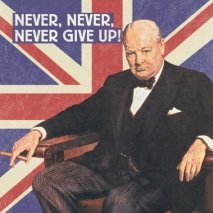 By the time Churchill was asked to lead the coalition government in 1940, he had already enjoyed colourful and controversial careers as a journalist, soldier and politician. He had twice 'crossed the floor' of the House of Commons, the first time defecting from Conservative to Liberal and serving as First Lord of the Admiralty during the early years of World War One.
By the time Churchill was asked to lead the coalition government in 1940, he had already enjoyed colourful and controversial careers as a journalist, soldier and politician. He had twice 'crossed the floor' of the House of Commons, the first time defecting from Conservative to Liberal and serving as First Lord of the Admiralty during the early years of World War One.
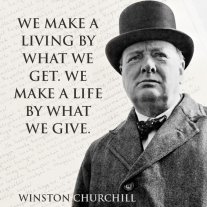 Following Neville Chamberlain's resignation in 1940, Churchill finally realized his 'destiny' and accepted the office of prime minister. Promising nothing more than 'blood, toil, tears and sweat', he almost single-handedly restored Britain's desire to fight on in adversity. Despite Churchill's enormous personal popularity, by 1945 the electorate no longer wanted a war leader and the Conservatives lost. His refusal to retire, despite suffering a stroke, caused mounting frustrations among his colleagues. At the age of 80, he finally conceded to his failing health and stepped down, although he continued to serve as an MP.
Following Neville Chamberlain's resignation in 1940, Churchill finally realized his 'destiny' and accepted the office of prime minister. Promising nothing more than 'blood, toil, tears and sweat', he almost single-handedly restored Britain's desire to fight on in adversity. Despite Churchill's enormous personal popularity, by 1945 the electorate no longer wanted a war leader and the Conservatives lost. His refusal to retire, despite suffering a stroke, caused mounting frustrations among his colleagues. At the age of 80, he finally conceded to his failing health and stepped down, although he continued to serve as an MP.
Tasks
Рівень 1
1. Complete the sentences.
- Following Neville Chamberlain's resignation in 1940 … .
- He almost single-handedly restored … .
- By 1945 the electorate no longer wanted a war leader and … .
- His refusal to retire caused … .
- Sir Winston Churchill stepped down, although … .
2. Match to make up word-combinations.
- to lead of prime minister
- controversial careers as a journalist
- the office the coalition government
- to serve as an MP
- as First Lord of World War One
- the early years of the Admiralty
Рівень 2
1. Choose the correct variant.
- Churchill was asked to lead the coalition government in … .
a) 1940; b) 1938; c) 1941.
- Churchill accepted the office of prime minister … .
a) 1939; b) 1940; c) 1941.
- The electorate no longer wanted a war leader by … .
a) 1940; b) 1943; c) 1945.
- He stepped down at the age of … .
a) 82; b) 80; c) 81.
2. Write what the italicized words mean.
1) Churchill was asked to lead the coalition government in 1940.
2) He enjoyed colourful and controversial careers as a journalist, soldier and politician.
3) He had twice 'crossed the floor' of the House of Commons.
4) Promising nothing more than 'blood, toil, tears and sweat', he almost single-handedly restored Britain's desire to fight on in adversity.
5) His refusal to retire caused mounting frustrations among his colleagues.
6) He stepped down at the age of 80.
Рівень 3
1. Write “true” or “false”.
1) Churchill was asked to lead the coalition government in 1941.
2) He had twice 'crossed the floor' of the House of Lords.
3) Churchill accepted the office of prime minister in 1940.
4) He almost single-handedly restored Britain's desire to fight on in adversity.
5) His refusal to retire caused mounting frustrations among his colleagues.
6) At the age of 82, he stepped down, although he continued to serve as an MP.
2. Write a composition about Sir Winston Churchill.
Text 3.
Read and translate the text about Princess Diana Spencer.
Vocabulary:
- grief [ɡriːf] - болісність, горе, жаль;
- throughout [θruːˈaʊt] – через;
- behalf [bɪˈhɑːf] - від імені;
- gesture [ˈdʒes.tʃər] - жестикулювати;
- groundbreaking [ˈɡraʊndˌbreɪ.kɪŋ] - новаторський
- passion [ˈpæʃ.ən] - запал, любов;
- stigma [ˈstɪɡ.mə] - болячка, тавро ганьби;
- tirelessly [ˈtaɪə.ləs] – невпинно;
- ban [bæn] – забороняти;
- landmine [ˈlænd.maɪn] - наземна міна
- fundraising [ˈfʌndˌreɪ.zɪŋ] - збір коштів;
- gala [ˈɡɑː.lə] - святкування, свято;
- awareness [əˈweə.nəs] – усвідомлення;
- compassion [kəmˈpæʃ.ən] - жаліти, співчувати.
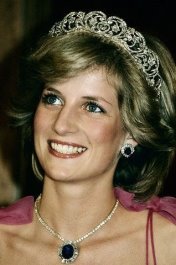
The late Diana, Princess of Wales, was born as Lady Diana Frances Spencer, on 1 July 1961.
She married HRH Prince of Wales at St. Paul’s Cathedral in London on 29 July 1981 and had two sons, Prince William Arthur Phillip Louis(now The Duke of Cambridge), born 21 July 1982 and Prince Henry (Harry) Charles Albert David born 15 September 1984.
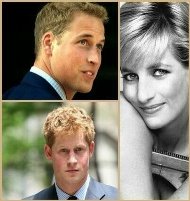 “I would like to be a queen in the hearts of the people.”
“I would like to be a queen in the hearts of the people.”
On 31 August 1997, the world found itself in a state of shock and later intense grief when Diana, Princess of Wales, died as the result of a car crash in Paris at the age of 36.
Diana’s Charity Work
Throughout her life, Diana devoted herself to serving others, especially those without a voice. She was President or Patron of over 100 charities as a part of her royal duties, many of which did work on behalf of homeless and disabled people, children, and people with HIV/AIDS.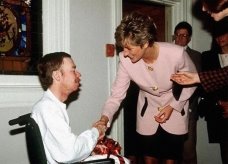
In 1987 at the age of 26, Diana was photographed shaking the hand of an AIDS patient and even more significantly, without gloves. It may be hard to believe now, but this simple gesture was groundbreaking to the stigma that was at the time attached to AIDS.
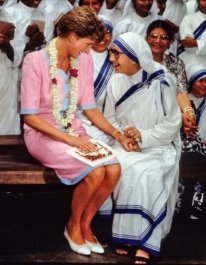 Her passion led her to become involved in helping a number of charities such as the International Campaign to Ban Landmines, advocating the rights of the homeless, supporting the disabled and ill children through Great Ormond Street Hospital, breaking down the stigma of the HIV/AIDS virus and many more.
Her passion led her to become involved in helping a number of charities such as the International Campaign to Ban Landmines, advocating the rights of the homeless, supporting the disabled and ill children through Great Ormond Street Hospital, breaking down the stigma of the HIV/AIDS virus and many more.
In February 1992, the Princess visited Mother Teresa’s Hospice for the Sick and Dying in Kolkata, India, and visited every one of the 50 patients who were close to death. In Rome shortly afterwards, and later in London and New York, she met Mother Teresa and the two formed a strong personal connection.
In the year before she died, Diana tirelessly campaigned to ban the manufacture and use of landmines.
Diana made many visits to North America, visiting hospices, schools, charities and fundraising galas, and touched the lives of many wherever she went. Other major overseas visits included Angola, Australia, Bosnia, Egypt, India, Pakistan, and many European countries.
The Princess spoke out on a wide range of issues and used her high profile to raise awareness as well as funds for charitable causes. She is rightly recognized and respected today as a true humanitarian.
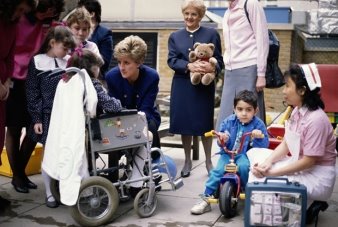 She also believed in the power of young people to change the world and that young people should be supported to make sure they reach their full potential.
She also believed in the power of young people to change the world and that young people should be supported to make sure they reach their full potential.
This means, a whole new generation of people are carrying on her work to change the world for the better, sharing the same characteristics Diana was known for in her life: compassion and kindness.
Tasks
Рівень 1
1. Match to make up word-combinations.
1) as the result of a) for the better
2) throughout her life, b) of issues
3) the rights of c) for charitable causes
4) a wide range d) a part of her royal duties
5) as well as funds e) the homeless
6) to change the world f) a car crash
2. Prove that Diana was a soft, kind and compassionate woman. Write about it.
Рівень 2
1. Write which proverb suits the best. Explain why.
a) Kindness begets kindness;
b) Forgive them for they know not what they do;
с) Englishman's home is his castle.
2. Write a composition about Diana’s charity work.
Рівень 3
1. Answer the following questions.
- Where was Princess Diana Spencer born?
- What are the names of her sons?
- She died, as the result of a car crash in Paris at the age of 36, didn’t she?
- Did she devote herself to serving others?
- Diana tirelessly campaigned to ban the manufacture and use of landmines, didn’t she?
2. Write your ideas about why Diana, the Princess of Wales is called ‘the people’s princess’.


про публікацію авторської розробки
Додати розробку
